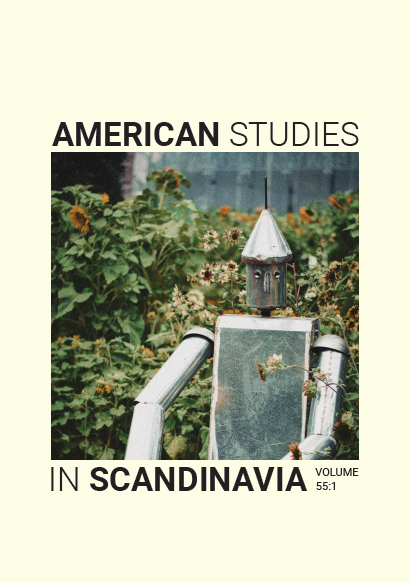Literary Border Crossing and Cultural Belonging in Frederick Schiller Faust’s The Gentle Gunman
DOI:
https://doi.org/10.22439/asca.v55i1.6859Keywords:
Western, Frederick Faust, gauchesque, border crossingAbstract
When Frederick Faust wrote The Gentle Gunman, locating it in Argentina, he did more than entertain American readers with new terrain in his western. By choosing to bordercross between the western and the Argentine gauchesque, he creates an opportunity to ask questions about the modernity of American and Argentine cultures and the national identities emphasized by both societies.
This article begins by analyzing the characteristics of the western and the gauchesque in Faust’s novel. This article also provides an overview of the historical moment of the novel’s creation, expectations of readers from the time period, and Faust’s decision to eroticize the western’s setting. By doing so, this article answers the question about the hero’s displacement in a modern world that values class elitism above heroic characteristics. While scholars have analyzed different elements of Faust’s life and works, they have not discussed his border-crossing between the literary genres of the western and the gauchesque, two genres that emphasis national identity. By focusing on Faust’s border-crossing, it will become evident that Faust championed specific traits embodied by the cowboy and, in one case, the gaucho––all of which foster a sense of who belongs to the landscape and who does not.
References
Alexander, Robert J. A History of Organized Labor in Argentina. Westport, CT: Praeger, 2003.
Bartles, Jason A. "Gauchos at the Origins: Lugones, Borges, Filloy." Variaciones Borges 40 (2015): 133-152.
Bergquist, Charles. Labor in Latin America: Comparative Essays on Chile, Argentina, Venezuela, and Colombia. Stanford, CA: Stanford UP, 1986.
Best, Gary Dean. The Dollar Decade: Mammon and the Machine in 1920s America. Westport, CT: Praeger Publishers, 2003.
Biderman, Shai. "'Do Not Forsake Me, Oh, My Darling': Loneliness and Solitude in Westerns." The Philosophy of the Western. Eds. Jennifer L. McMahon and B. Steve Csaki.
Lexington, Ky: The UP of Kentucky. 2010. 13-30.
Bloodworth, William. Max Brand. Woodbridge, CT: Twayne, 1993. "Max Brand's West." Western American Literature 16. 3 (1981): 177-191.
Brennan, James P., and Pianetto, Ofelia. Region and Nation: Politics, Economy, and Society in Twentieth-Century Argentina. London: Palgrave Macmillan, 2000. https://doi.org/10.1007/978-1-349-62844-5
Brown, Richard Harvey. "Cultural Representation and Ideological Domination." Social Forces 71.3 (1993): 657-76. https://doi.org/10.2307/2579889
Castedo-Ellerman, Elena. "The Gaucho's Attitude on Race and Nationality in Gauchesque Literature." Afro-Hispanic Review 3.1 (1984): 13-18.
Cho, Ryan. "Cultural Appropriation and Choral Music: A Conversation that Can Make Both Our Music and Community Better." The Choral Journal 55. 10 (2015): 59-63.
"Douglas Fairbanks Uses a New Weapon, the Bola." New York Times. 17 October 1927: 97.
Errázuriz, Tomás, and Guillermo Giucci. "The Ambiguities of Progress: Cultural Appropriation of Electric Trams in the Southern Cone, 1890-1950 (Chile, Argentina, Uruguay and Brazil)." Icon 22 (2016): 55-77.
Etulain, Richard. "Research Opportunities in Western Literary History." Western Historical Quarterly 4. 3 (1973): 263-272. https://doi.org/10.2307/967727
Faust, Frederick Schiller. The Gentle Gunman. New York: Berkley Books, 1990.
Goldberg, David J. "Rethinking the 1920s: Historians and Changing Perspectives." OAH Magazine of History 21. 3 (2007): 7-10. https://doi.org/10.1093/maghis/21.3.7
Hart, Stephen M. "Some Notes on Literary Print Culture in Spanish America: 1880-1920." Anales de la literatura española contemporánea 23.1 (1998): 165-80.
Huberman, Ariana. Gauchos and Foreigners: Glossing Culture and Identity in the Argentine Countryside. Plymouth, UK: Lexington Books, 2011.
Lionnet, Francoise. "Logiques métisses": Cultural Appropriation and Postcolonial Representations." College Literature 19/20. 3/1 (1993): 100-120.
Ludmer, Josefina. The Gaucho Genre: A Treatise on the Motherland. Durham: Duke UP, 2002. https://doi.org/10.1515/9780822383567
Matthes, Erich Hatala. "Cultural Appropriation Without Cultural Essentialism?" Social Theory and Practice 42. 2 (2016): 343-366. https://doi.org/10.5840/soctheorpract201642219
McMahon, Jennifer L., and B. Steve Csaki. "Introduction: Philosophy and the Western." The Philosophy of the Western. Eds. Jennifer L. McMahon and B. Steve Csaki. Lexington, Ky: UP of Kentucky, 2010. 1-12.
Mitchell, Lee Clark. "'When You Call Me That…': Tall Talk and Male Hegemony in The Virginian." PMLA 102. 1 (1987): 66-77. https://doi.org/10.2307/462493
Richardson, Darrell C. "The Life and Works of Max Brand." The Max Brand Companion. Eds. Jon Tuska and Vicki Piekarski. Westport, CT: Greenwood P, 1996. 436-448.
Selig, Diane. "Celebrating Cultural Diversity in the 1920s." OAH Magazine of History 21.3 (2007): 41-2. https://doi.org/10.1093/maghis/21.3.41
Sheinin, David M.K. Argentina and the United States: An Alliance Contained. Athens, GA: U of Georgia P, 2006.
Slatta, Richard W. Comparing Cowboys and Frontiers. Norman, OK: U of Oklahoma P, 1983.
Slotkin, Richard. Gunfighter Nation: The Myth of the Frontier in Twentieth-Century America. Norman, OK: U of Oklahoma P, 1998.
Stoeltje, Beverly J. "Paredes and the Hero: The North American Cowboy Revisited." The Journal of American Folklore 125.495 (2012): 45-68. https://doi.org/10.5406/jamerfolk.125.495.0045
Tebbe, Jennifer. "Print and American Culture." American Quarterly 32.3 (1980): 259-79. https://doi.org/10.2307/2712450
Tuska, Jon. "Frederick Faust's Western Fiction: An Overview." The Max Brand Companion. Eds. Jon Tuska and Vicki Piekarski. Westport, CT: Greenwood P, 1996. 371-410.
Uyl, Douglas J. Den. "Civilization and Its Discontents: The Self-Sufficient Western Hero." The Philosophy of the Western. Eds. Jennifer L. McMahon and B. Steve Csaki. Lexington, Ky: The UP of Kentucky, 2010. 31-54.
Downloads
Published
How to Cite
Issue
Section
License
Copyright (c) 2023 Susan Savage Lee

This work is licensed under a Creative Commons Attribution-NonCommercial-NoDerivatives 4.0 International License.



